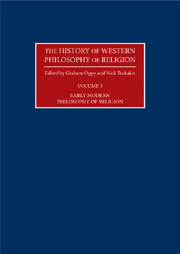Book contents
- Frontmatter
- Contents
- Editorial Introduction
- Contributors
- 1 Early Modern Philosophy of Religion: An Introduction
- 2 Niccolò Machiavelli
- 3 Martin Luther
- 4 John Calvin
- 5 Michel de Montaigne
- 6 Francisco Suárez
- 7 Thomas Hobbes
- 8 René Descartes
- 9 Ralph Cudworth
- 10 Blaise Pascal
- 11 Baruch Spinoza
- 12 John Locke
- 13 Gottfried Wilhelm Leibniz
- 14 George Berkeley
- 15 Voltaire
- 16 The Deists
- 17 Jonathan Edwards
- 18 Thomas Reid
- 19 David Hume
- 20 Denis Diderot
- 21 Immanuel Kant
- 22 Gotthold Ephraim Lessing
- 23 William Paley
- Chronology
- Bibliography
- Index
10 - Blaise Pascal
- Frontmatter
- Contents
- Editorial Introduction
- Contributors
- 1 Early Modern Philosophy of Religion: An Introduction
- 2 Niccolò Machiavelli
- 3 Martin Luther
- 4 John Calvin
- 5 Michel de Montaigne
- 6 Francisco Suárez
- 7 Thomas Hobbes
- 8 René Descartes
- 9 Ralph Cudworth
- 10 Blaise Pascal
- 11 Baruch Spinoza
- 12 John Locke
- 13 Gottfried Wilhelm Leibniz
- 14 George Berkeley
- 15 Voltaire
- 16 The Deists
- 17 Jonathan Edwards
- 18 Thomas Reid
- 19 David Hume
- 20 Denis Diderot
- 21 Immanuel Kant
- 22 Gotthold Ephraim Lessing
- 23 William Paley
- Chronology
- Bibliography
- Index
Summary
Blaise Pascal (1623–62) was a towering intellectual figure in seventeenth-century France, the last of the universal geniuses in European history. His discoveries and ideas still have great influence in modern intellectual and scientific life. A true polymath, he made contributions in physics, mathematics, philosophy and theology. Students of physics have heard of Pascal's vases; students of mathematics know of his triangle. It was he who established experimentally that the weight of the earth's atmosphere varies according to altitude and first gave theoretical embodiment to the idea of the vacuum. His ideas also gave rise variously to the concept of the calculator or computer and to inexpensive public transportation.
In 1646, at the age of 23, Pascal had a profound religious experience when he became associated with a group of disciples of Jean du Vergier, the Abbé de Saint-Cyran, who lived in the vicinity of Rouen. He accepted their doctrine of ‘conversion’ or abandonment of the world and submission to God, and even converted his family to Jansenism. This conversion, however, did not have an immediate effect on his work. One reason was that he became seriously ill in 1647 and returned to Paris, where his physicians advised him to find diversions from his work. That advice led him to relax the religious discipline.
Another profound mystical experience occurred in 1654 when Pascal became intimately associated with the Convent of Port-Royal, where his sister Jacqueline had become a religious initiate and where Saint-Cyran was spiritual director.
- Type
- Chapter
- Information
- The History of Western Philosophy of Religion , pp. 127 - 140Publisher: Acumen PublishingPrint publication year: 2009
- 1
- Cited by

